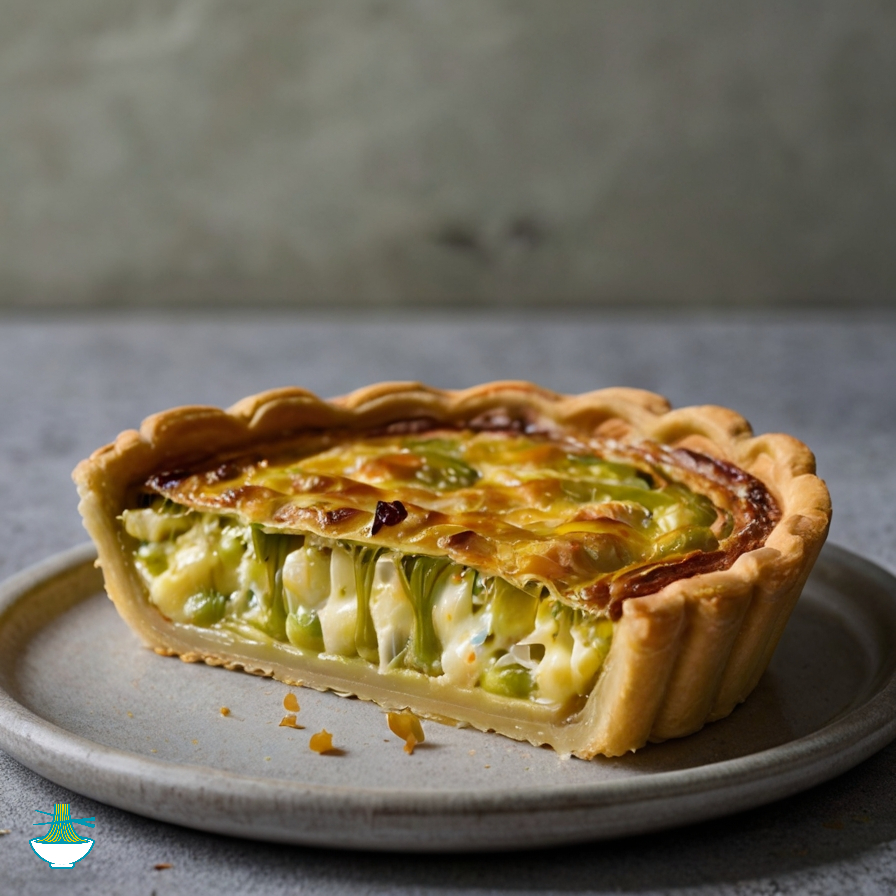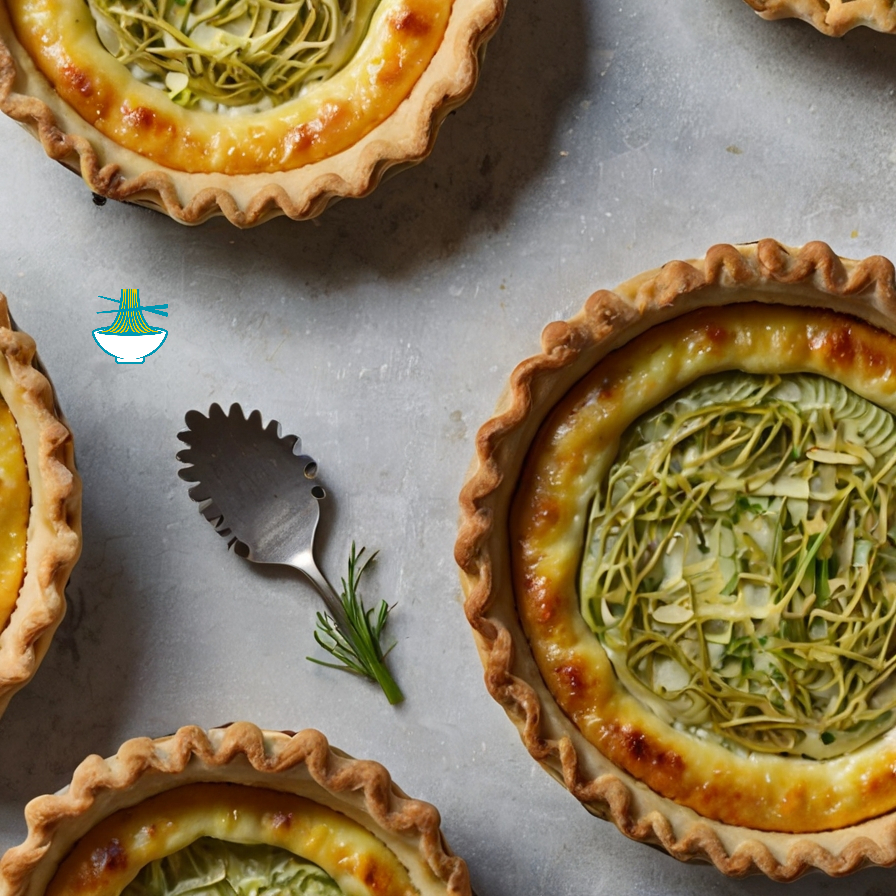The Welsh Leek and Cheese Tart is a traditional dish that reflects Wales' rich culinary heritage. This savory tart combines the delicate sweetness of leeks with the rich creaminess of cheese, bound together by eggs and encased in a flaky pastry crust. The recipe has roots in Welsh farmhouse cooking, where ingredients like leeks, cheese, and eggs were staples due to their availability and nutritional value.
Historically, leeks have been a symbol of Wales, even appearing on the country's national emblem. They were commonly grown in Welsh gardens and used extensively in local cuisine. The addition of cheese, often a sharp cheddar or Caerphilly cheese, adds a depth of flavor that complements the leeks beautifully.
The Welsh Leek and Cheese Tart is not only a delicious dish but also a representation of Welsh culinary tradition, showcasing simple yet flavorful ingredients prepared with care and expertise.
Ingredients:
- 2 large leeks, washed and thinly sliced
- 1 cup shredded sharp cheddar cheese
- 4 eggs
- 1 pre-made pie crust or pastry dough
- Salt and pepper to taste
- Olive oil for sautéing

Method:
1. Preheat your oven to 375°F (190°C).
2. Heat a drizzle of olive oil in a pan over medium heat.
3. Add the sliced leeks to the pan and sauté until they are soft and slightly caramelized, about 8-10 minutes. Season with salt and pepper to taste.
4. In a bowl, beat the eggs and stir in the shredded cheddar cheese.
5. Place the pre-made pie crust or pastry dough in a tart pan or pie dish.
6. Spread the sautéed leeks evenly over the bottom of the crust.
7. Pour the egg and cheese mixture over the leeks, ensuring it covers the entire surface.
8. Bake in the preheated oven for 25-30 minutes or until the tart is set and the crust is golden brown.
9. Let it cool slightly before slicing and serving.
Nutrition Value:
1. 2 large leeks, washed and thinly sliced:
- Calories: Approximately 60 calories per leek (120 calories for 2 leeks)
- Carbohydrates: About 15 grams per leek (30 grams for 2 leeks)
- Protein: Around 2 grams per leek (4 grams for 2 leeks)
- Fat: Negligible, less than 1 gram per leek
- Sodium: Low, typically less than 10 milligrams per leek
- Cholesterol: Zero
- Vitamins and minerals: High in vitamin K, vitamin C, folate, and manganese. Also contains significant amounts of vitamin A, vitamin B6, iron, and potassium.
- Nutritional benefit: Leeks are rich in antioxidants, vitamins, and minerals. They support heart health, digestion, and immune function.
2. 1 cup shredded sharp cheddar cheese:
- Calories: Approximately 450 calories per cup
- Carbohydrates: Less than 2 grams per cup
- Protein: About 28 grams per cup
- Fat: Around 37 grams per cup
- Sodium: Varies but can be around 600 milligrams per cup
- Cholesterol: About 120 milligrams per cup
- Vitamins and minerals: High in calcium, phosphorus, vitamin A, and vitamin B12. Also contains vitamin D, zinc, and selenium.
- Nutritional benefit: Cheddar cheese provides protein and essential nutrients like calcium for bone health and vitamin B12 for nerve function.
3. 4 eggs:
- Calories: Approximately 70 calories per egg (280 calories for 4 eggs)
- Carbohydrates: Less than 1 gram per egg (4 grams for 4 eggs)
- Protein: About 6 grams per egg (24 grams for 4 eggs)
- Fat: Around 5 grams per egg (20 grams for 4 eggs)
- Sodium: Around 70 milligrams per egg (280 milligrams for 4 eggs)
- Cholesterol: Approximately 185 milligrams per egg (740 milligrams for 4 eggs)
- Vitamins and minerals: High in vitamin D, vitamin B12, selenium, and choline. Also contains vitamin A, vitamin B6, iron, and zinc.
- Nutritional benefit: Eggs are a complete protein source and provide essential nutrients for brain health, eye health, and muscle function.
4. 1 pre-made pie crust or pastry dough:
- Nutritional information can vary significantly depending on the brand and type of crust or dough used. It typically contributes calories, carbohydrates, and fats to the recipe.
5. Salt and pepper to taste:
- Salt contributes sodium to the dish, while pepper adds flavor without significant nutritional impact in the quantities typically used.
6. Olive oil for sautéing:
- Calories: Approximately 120 calories per tablespoon (estimate for sautéing)
- Fat: Around 14 grams per tablespoon
- Other nutrients: Contains vitamin E and healthy monounsaturated fats.
- Nutritional benefit: Olive oil is a source of healthy fats that support heart health and provide antioxidant benefits.
These nutritional values are approximate and can vary based on specific brands, portion sizes, and cooking methods.


Comments